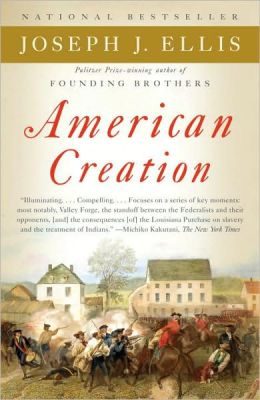In American Creation Joseph Ellis, a prominent scholar of the American Revolution known for his embrace of the Sally Hemings myth (see “Tom and Sally and Joe and Fawn,” by Egon Richard Tausch, Views, March 1999), shows how serendipitously the American founding actually unfolded, hardly in accordance with the godlike clarity of vision suggested by our national hagiography. Instead, we learn that Washington’s insight of “land and time” being on his side affected his conduct of the war; Adams was ambivalent regarding democracy; Jefferson’s words and actions regarding the power of the presidency were often contradictory; the delayed application of the most provocative statements of the Declaration of Independence actually set the stage for enlarging the American franchise; Madison’s purposeful ambiguity in parts of the Constitution enabled its passage; and the founders’ conflicted treatment of the Indians reflected the realpolitik they all exercised.
Yet Ellis fails to identify the full context of the founders’ responses to the events he portrays. They were men of the 18th century, who had a high regard for ancient Rome, its leaders, and the virtues they valued. Certainly, Washington’s admiration and emulation of the upright Cato and the noble Cincinnatus are well attested. However, the Roman model also shaped the seemingly disparate personalities of Adams, Jefferson, and Madison. For example, Adams said of Cicero, “All ages of the world have not produced a greater statesman and philosopher combined.” Cicero loved the Roman Republic above all else. Though preferring the optimates, he was willing to compromise with the populares for the sake of preserving the state. This flexibility characterized all the founders. What made them great was their willingness to perceive situations broadly, allowing them to sacrifice personal preference for the common good.
As for democracy, the founders’ understanding of popular government was hardly the modern one. They favored a republic directed by an aristocracy of the elite, a meritocracy of virtue. Jefferson himself was repelled by the candidacy of Jackson. “Adams,” Ellis writes, “feared the people as much as the monarchy, neither of which, he wisely reckoned, was omniscient.” For Adams, “the revolution was a transfer of authority from a corrupt regime to a more enlightened one.”
Ellis’s fondness for Jefferson and Madison leads him to give them more credit than they deserve for the conscious direction of America’s policies. For example, he contends that Jefferson stealthily inserted into the Declaration of Independence the famous words regarding equality, rights, and the “consent of the governed” to plant the seeds of a real revolution—one that would mandate individual rights, end slavery, provide for women’s suffrage, and sanction civil rights. This utterly anachronistic reading goes far beyond anything that Jefferson’s limited view of republican government could have endured.
Similarly, Ellis portrays Madison as having had an activist agenda for the Constitution. The ratification of that document, he contends, was primarily the result of Madison’s ambiguous language. Ellis suggests that the main purpose of the Constitution was to provide “a political framework for an ongoing negotiation between the states and federal government.” Certainly, the South had no such understanding! “Because of [the founders] the American Revolution moved forward,” Ellis says, “with deliberate speed, the effects of which are still shaping us today.” This is more a disservice to the founders’ vision than a compliment to their farsightedness.
As Henry Adams wrote when examining the conduct of British politicians during the American Civil War, “they were a sum of contradictions.” The same can be said of the founders, and indeed politicians of every age.
[American Creation: Triumphs and Tragedies at the Founding of the Republic, by Joseph J. Ellis (New York: Alfred A. Knopf) 304 pp., $26.95]

Leave a Reply